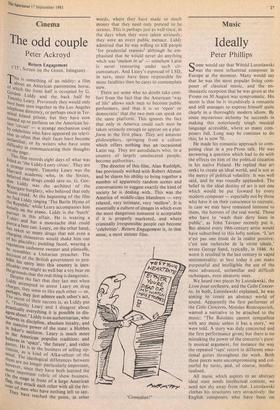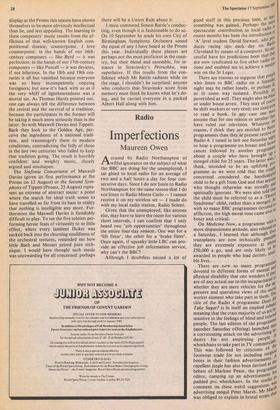Music
Ideally
Peter Phillips
Some would say that Witold Lutoslawski was the most influential composer in Europe at the moment. Many would say that he was the most popular living com- poser of classical music, and the en- thusiastic reception that he was given at the Proms on 30 August was symptomatic. His secret is that he is impulsively a romantic and still manages to express himself quite clearly in a thoroughly modern idiom. By some mysterious alchemy he succeeds in making this notoriously tough musical language accessible, where so many com- posers fail. Long may he continue to do this; he is now 70.
He made his romantic approach to com- posing clear in a pre-Prom talk. He was answering a question which had to do with the effects on him of the political situation in his native Poland. He replied that art seeks to create an ideal world, and is not at the mercy of political volatility. It was well said, and he was roundly applauded. The belief in the ideal destiny of art is not one which would be put forward by every modern composer — especially not by those who have it on their conscience to recreate, in case we may have remained immune to them, the horrors of the real world. Those who have to `wash their dirty linen in public', as John Tavener recently put it. But almost every 19th-century artist would have subscribed to this lofty notion. `L'art n'est pas une etude de la realite positive; c'est une recherche de la verite ideale,' wrote George Sand, typically, in 1846. At worst it resulted in the last century in vapid sentimentality: at best today it can make purposeful and intelligible the use of the most advanced, unfamiliar and difficult techniques, even aleatoric ones.
We heard two pieces by Lutoslawski, the Livre pour orchestre, and the Cello Concer- to. In both, Lutoslawski explained, he was aiming to create an abstract world of sound. Apparently the first performer of the Cello Concerto, Mstislav Rostropovich, wanted a narrative to be attached to the music: 'The Russians cannot sympathise with any music unless it has a story,' we were told. A story was duly concocted and the first performance given; but there is no mistaking the power of the concerto's pure- ly musical argument, for instance the way the repeated 'taps' return in different emo- tional guises throughout the work. Both these pieces were uncompromising and col- ourful by turns, and, of course, intellec- tualised.
All music which aspires to an abstract ideal state needs intellectual content, we need not shy away from that. Lutoslawski clothes his structures very attractively: the English composers who have been on
display at the Proms this season have shown themselves to be more obviously intellectual than he, and less appealing. The learning in these composers' music results from the af- fliction of that well-known English com- positional disease, counterpoint. I love counterpoint: in the hands of our 16th- century composers — like Byrd — it was perfection; in the hands of our 17th-century composers — like Purcell — it was devious, if not hilarious. In the 18th and 19th cen- turies it all but vanished because everyone was so busy incompetently copying foreigners; but now it's back with us as if the very whiff of lightheartedness was a mortal sin. As Thomas Hardy pointed out, one can always tell the difference between the revival and the survival of a tradition, because the participants in the former will be taking it much more seriously than in the latter. So with Maxwell Davies and Tippett. Back they look to the Golden Age, per- ceive the ingredients of a national tradi- tion, and transmogrify them to modern conditions, contradicting the folly of those in the last two centuries who failed to keep that tradition going. The result is horribly confident and weighty music, closely argued and misshapen.
The Sinfonia Concertante of Maxwell Davies (given its first performance at the Proms on 12 August) or the Second Sym- phony of Tippett (Proms, 25 August) repre- sent an extreme of abstract music: a point where the search for ideal truth seems to have travelled so far from its base in reality that nothing is intelligible any more, Fur- thermore the Maxwell Davies is fiendishly difficult to play. To see the five soloists per- forming heroic feats of virtuosity to so little effect, where every lambent flicker was sucked back into the churning muddiness of the orchestral textures, reminded me how little Bach and Mozart prized pure tech- nique. I would have thought such music was unrewarding for all concerned: perhaps
there will be a Union Rule about it.
I must commend Simon Rattle's conduc- ting, even though it is fashionable to do so. On 10 September he made his own City of Birmingham Symphony Orchestra sound the equal of any I have heard at the Proms this year. Individually these players are perhaps not the most proficient in the coun- try, but their blend and ensemble, for in- stance in Stravinsky's Pet rushka, was superlative. If this results from the con- fidence which Mr Rattle radiates while on the stage, I shouldn't be surprised: anyone who conducts that Stravinsky score from memory must think he knows what he's do- ing, and he carried everyone in a packed Albert Hall along with him.







































 Previous page
Previous page